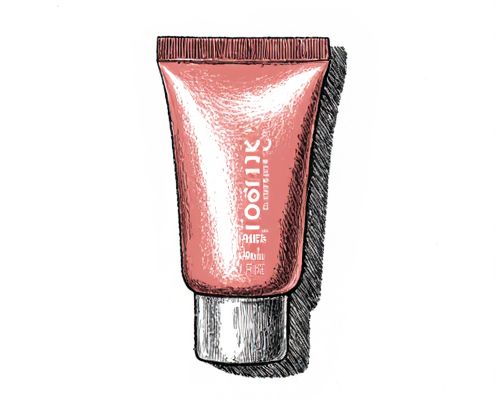
Lip Mask Illustration
A lip mask deeply hydrates and restores softness to dry, chapped lips by delivering intense moisture and essential nutrients. Formulated with ingredients like hyaluronic acid, shea butter, and vitamin E, it helps to plump and smooth fine lines for a youthful appearance. Regular use enhances lip texture, leaving lips silky, replenished, and ready for flawless lipstick application.
Introduction to Lip Masks in Modern Cosmetics
Lip masks have become essential in modern cosmetics for intensely hydrating and rejuvenating dry, chapped lips. Formulated with nourishing ingredients like hyaluronic acid, shea butter, and collagen, they provide deep moisture and improve lip texture overnight. These targeted treatments enhance lip softness, smoothness, and overall appearance, making them a staple in advanced skincare routines.
Key Benefits of Using Lip Masks Regularly
Lip masks provide intense hydration and nourishment, effectively softening dry, chapped lips by locking in moisture with ingredients like hyaluronic acid and shea butter. Regular use accelerates lip cell regeneration, reducing fine lines and promoting a plump, youthful appearance. Enhanced with antioxidants and vitamins, lip masks protect against environmental damage and improve overall lip texture and color.
Essential Ingredients to Look for in Lip Masks
Hyaluronic acid, shea butter, and vitamin E are essential ingredients in lip masks that provide deep hydration and repair cracked lips effectively. Natural oils such as jojoba and coconut oil help lock in moisture while restoring the skin's barrier for a smooth, plump appearance. Antioxidants and peptides boost collagen production, enhancing lip texture and promoting long-lasting softness.
How Lip Masks Enhance Lip Health and Appearance
Lip masks provide intense hydration by delivering moisture-rich ingredients like hyaluronic acid and vitamin E directly to the lips, improving softness and preventing dryness. They promote healing of chapped lips and enhance natural lip color by boosting blood circulation and collagen production. Consistent use reduces fine lines and creates a smoother, fuller lip appearance, contributing to overall lip health and aesthetic appeal.
Natural vs. Synthetic Lip Mask Formulations
Natural lip mask formulations often contain ingredients like shea butter, jojoba oil, and beeswax, providing deep hydration and nourishment without harsh chemicals. Synthetic lip masks may include petrolatum, silicones, and artificial fragrances that offer immediate smoothing effects but can sometimes cause irritation or dryness over time. Choosing a natural lip mask supports your skin's health by reducing exposure to potentially harmful additives while delivering effective moisture and repair.
Step-by-Step: How to Use a Lip Mask Effectively
Apply a generous layer of the lip mask onto clean, dry lips, ensuring full coverage for optimal hydration. Leave the mask on for 10-15 minutes to allow nourishing ingredients like hyaluronic acid and shea butter to deeply penetrate and repair chapped lips. Gently wipe off any excess with a damp cloth or tissue before proceeding with your regular lip care routine for maximum softness and smoothness.
Common Mistakes to Avoid with Lip Masks
Applying lip masks too frequently can lead to overhydration and irritation, disrupting the natural moisture balance of your lips. Using lip masks on chapped or cracked lips without gentle exfoliation may prevent proper absorption and reduce effectiveness. Avoid sleeping with a lip mask every night to prevent dependency and allow your lips to naturally regenerate.
Top-Rated Lip Masks for Every Skin Type
Top-rated lip masks are formulated with nourishing ingredients like hyaluronic acid, shea butter, and vitamin E to deeply hydrate and repair your lips. Brands such as Laneige, Burt's Bees, and KOCOSTAR offer specialized lip masks designed to suit dry, sensitive, and normal skin types, ensuring effective moisture retention and smoothness. Choosing the right lip mask for your skin type enhances softness, reduces chapping, and maintains optimal lip health.
Lip Mask Application: Tips for Maximum Results
Apply a lip mask on clean, exfoliated lips to enhance absorption and effectiveness. Leave the mask on for 10-15 minutes to deeply hydrate and nourish the delicate skin, focusing on areas prone to dryness or cracking. Consistent use, ideally 2-3 times per week, helps maintain smooth, plump, and revitalized lips with maximum results.
Lip Masks vs. Traditional Lip Balms: A Comparative Guide
Lip masks deliver intensive hydration through occlusive ingredients like shea butter and hyaluronic acid, offering deeper moisture retention compared to traditional lip balms that primarily provide surface-level protection. Infused with nourishing vitamins and peptides, lip masks often support skin repair and improve texture overnight, whereas lip balms mainly prevent dryness and chapping during the day. Consumers seeking long-lasting, restorative lip care benefit from lip masks' advanced formulation, making them ideal for nighttime treatment and addressing severely dry or damaged lips.
 womendy.com
womendy.com